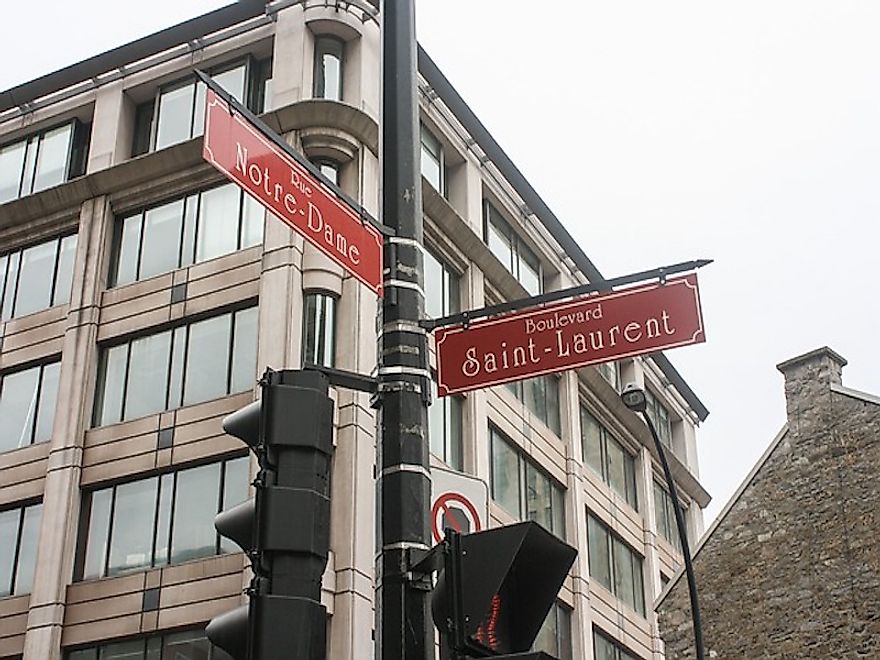Canadian Provinces/Territories By Percentage Of French Speaking Population

French is one of the two official languages in Canada. Although French can be spoken by a significant number of people in all the provinces and territories of Canada, Quebec is the only province where majority of the population speaks French. French is a mother tongue of about 7 million Canadians or 22% of the population. French is recognized as an official language alongside English in the Official Language Act of 1969 with both languages where recognized as having equal status in the government of Canada.
History Of Canadian French
French settlements and private companies were established in areas around present-day Eastern Canada in the early 17th century. Acadia and Quebec City were founded by Samuel de Chaplain in 1605 and 1608 respectively. By 1634, two hundred settlers who were mainly fur traders occupied Quebec. A secondary school was founded in Quebec in 1635 by Jesuit to offer education to the Children in the city. French became the language of the non-native people in Quebec by 1645. However, the Treaty of Utrecht in 1713 led to the British dominating much of the Eastern Canada relegating French to second on trade and communication. Out of necessity, several schools adopted the teaching of English as the country became bilingual. The Anglicization of Canada was not successful because the French-speaking inhabitants continued to speak French only. In 1774, Quebec Act was passed by the parliament to restore French Civil laws.
French As An Official Language
French was declared an official language alongside English in the Official Languages Act of 1969. The Act requires that all government activities, court proceedings, and legislations be carried out in English, French or both. French is the official language in Quebec with most of the debates, legislation, and court proceedings conducted in French. However, the law also provides for the use of English in Quebec. Even in provinces and territories where English is the dominant language, French is normally used for the benefit of the public and in line with the Canadian laws. Two types of French are spoken in Canada, French spoken in Quebec and French spoken by Acadians.
Popularity Of French In The Canadian Provinces
Quebec has the highest number of French-speakers in Canada both by the proportion of the population in the province and the proportion of the entire population in the country. 79.95% of the population of Quebec speaks French as their first language while 95% of the Quebecers can speak French. In all the other provinces of Canada, the proportion of the people whose mother tongue is not French but have knowledge of French range between 28% and 0.22%. 28.36% of the population of New Brunswick speaks French as their mother tongue, the second highest in the country. Nunavut, Alberta, Saskatchewan, British Columbus, and Newfoundland have the smallest populations of French speakers with less than 1% of their population speaking French. On average 20.61% of the Canadian population speak French at home on a regular basis. However, the figures indicate a decline in the proportion of the Canadians who are using French as their mother tongue.
Canadian Provinces/Territories By Percentage Of French Speaking Population
| Rank | Canadian Province/territory | % Of Population Speaking French At Home, 2011 | Official language(s) |
|---|---|---|---|
| 1 | Quebec | 79.95% | French |
| 2 | New Brunswick | 28.36% | English, French |
| 3 | Canada (country-wide) | 20.61% | English, French |
| 4 | Yukon | 2.43% | English, French |
| 5 | Ontario | 2.23% | English (de facto) |
| 6 | Prince Edward Island | 1.78% | English (de facto) |
| 7 | Nova Scotia | 1.75% | English (de facto) |
| 8 | Manitoba | 1.5% | English |
| 9 | Northwest Territories | 1.35% | Chipewyan, Cree, English, French, Gwich’in, Inuinnaqtun, Inuktitut, Inuvialuktun, North Slavey, South Slavey, Tłįchǫ |
| 10 | Nunavut | 0.77% | Inuit language (Inuktitut, Inuinnaqtun), English, French |
| 11 | Alberta | 0.68% | English |
| 12 | Saskatchewan | 0.42% | English |
| 13 | British Columbia | 0.38% | English (de facto) |
| 14 | Newfoundland and Labrador | 0.22% | English (de facto) |







